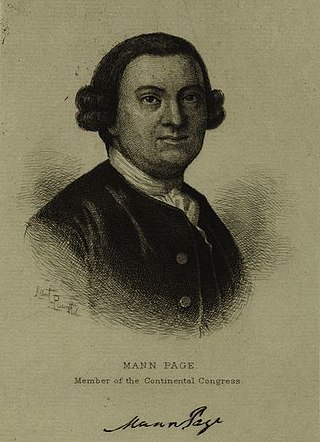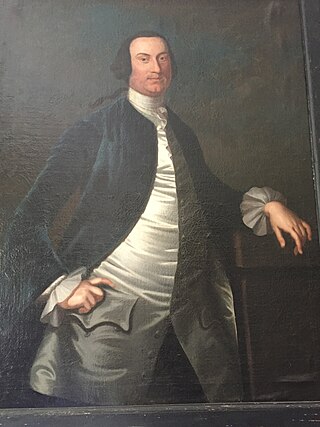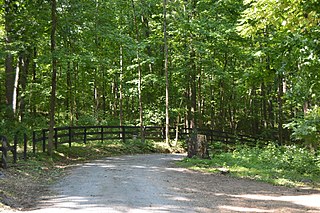Related Research Articles
Old money is "the inherited wealth of established upper-class families " or "a person,family,or lineage possessing inherited wealth". It is a social class of the rich who have been able to maintain their wealth over multiple generations,often referring to perceived members of the de facto aristocracy in societies that historically lack an officially established aristocratic class,in contrast with new money whose wealth has been acquired within its own generation.

Mann Page (1749–1781),sometimes referred to as Mann Page III,was an American lawyer,politician and planter from Spotsylvania County,Virginia,who served in the House of Burgesses and first Virginia House of Delegates as well as a delegate for Virginia to the Continental Congress in 1777. His elder half brother was Virginia Governor John Page. Since the name was common in the family,and five men of the same name served in the Virginia General Assembly,relationships are discussed below.
Colonel Thomas Lee was a planter and politician in colonial Virginia,and a member of the Lee family,a political dynasty. Lee became involved in politics in 1710,serving in both houses of the Virginia General Assembly,and also held important positions as Naval Officer for the Northern Potomac Region and agent for the Northern Neck Proprietary. After his father died,Lee inherited thousands of acres of land as well as enslaved people in then-vast Northumberland and Stafford Counties in Virginia as well as across the Potomac River in Charles County,Maryland. These properties were developed as tobacco plantations. Northumberland County was later subdivided,so some of Lee's properties were in present-day Fairfax,Fauquier,Prince William,and Loudoun counties and counties in the present-day Northern Neck of Virginia.
Richard Corbin was a Virginia planter and politician who represented Middlesex County in the House of Burgesses and the Virginia Governor's Council. Although a noted Loyalist during the American Revolutionary War,he considered himself a Virginian and two of his descendants of the same name also served in the Virginia General Assembly following the conflict.
Thomas Grosvenor Corbin was a career United States Navy officer descended from the First Families of Virginia who remained loyal to the Union during the American Civil War. During the war,he served as the commandant of midshipmen at the U.S. Naval Academy and commanded a ship in the Union blockade of southern ports. Although he never married,he had many relatives,including military members,across the United States,so his relation to Air Force Major General Thomas Goldsborough Corbin (1917–1992) is unclear.

Col. John Tayloe II was a Virginia planter and politician who served on the Virginia Governor's Council,also known as the Virginia Council of State. A colonial Colonel in the Virginia Militia,he is better remembered as an ironmaster,horse breeder,racing enthusiast and father-in-law of United States Declaration of Independence signer Francis Lightfoot Lee.

Col. John Tayloe I of Richmond County on Virginia's Northern Neck became one of the richest plantation owners and businessmen in his colony,as well as served in both houses of the colonial legislature and founded a political dynasty. Sometimes referred to as "Hon. Colonel of the Old House",together with his son,John Tayloe II,and grandson,John Tayloe III,he exemplified gentry entrepreneurship diversifying business interests through vertical integration.

Moss Neck Manor is a historic antebellum plantation house located at Rappahannock Academy,Caroline County,Virginia,United States.
Christopher Robinson was a planter,merchant and politician in the British colony of Virginia. Robinson held several public offices in Colonial Virginia and is the patriarch in America for one of the First Families of Virginia.

Henry Corbin was an emigrant from England who became a tobacco planter in the Virginia colony and served in both houses of the Virginia General Assembly,in the House of Burgesses representing Lancaster County before the creation of Middlesex County on Virginia's Middle Neck,then on the Governor's Council.

William Augustine Washington was a Virginia planter and officer who served one term in the Virginia House of Delegates representing Westmoreland County,as well as terms as colonel of the county militia and as the county sheriff,before moving to the newly established District of Columbia. The son of the half-brother of President George Washington,he was also one of the seven executors of the former President's estate.
Robert Wormeley Carter II was a Virginia planter who served multiple terms in both houses of the Virginia General Assembly. In his early and last terms,he represented his native Richmond County in the Virginia House of Delegates,then for eight years represented the counties of the Northern Neck of Virginia in the Virginia Senate.
John Grymes or Grimes was a Virginia planter and politician who served in both houses of the Virginia General Assembly,first representing Middlesex County in the House of Burgesses(1718-1722) and on Virginia Governor's Council(1726-1748).

Ralph Wormeley who like his namesake grandfather was a planter and politician who represented Middlesex County in the House of Burgesses. He and his bookloving and loyalist son also operated Rosegill plantation,now on the National Register for Historic Places,using enslaved labor.
Gawin Corbin Jr.,although trained as a lawyer in England,became a Virginia planter,loyalist militia officer,customs collector and politician who served in both chambers of the Virginia General Assembly as had his father Richard Corbin.
Gawin Corbin (1669-1745) was a Virginia planter,militia officer,customs collector and politician who served in the House of Burgesses representing at various times Middlesex and King and Queen County. Two descendants of the same name would also serve in the House of Burgesses,Gawin Corbin Sr. and Gawin Corbin Jr.
Gawin Corbin (1725-1760) was a Virginia planter and politician who served in the House of Burgesses representing Middlesex County,Virginia in the term in which his father of the same name died.
Francis Corbin was a Virginia lawyer,planter and politician,who represented Middlesex County in the Virginia House of Delegates and the Virginia Ratifying Convention and later moved to Caroline County.
John Tayloe Corbin was a Virginia planter and politician who represented King and Queen County in the House of Burgesses. The son of powerful planter Richard Corbin,a member of the Governor's Council,he was likewise a Loyalist during the American Revolutionary War,but remained in Virginia. He was named after his maternal grandfather John Tayloe I.
Gawin Lane Corbin was a Virginia planter,officer and politician who thrice represented York County in the Virginia House of Delegates and was severely wounded defending Hampton in the War of 1812.
References
- ↑ Return J. Meigs, The Corbins of Virginia: A Genealogical Record of the Descendants of Henry Corbin who Settled in Virginia in 1654 (1940) p. 17
- ↑ Robert Barnes (indexer), Genealogies of Virginia Families from the Virginia Magazine of history and Biography, vol.2 (Baltimore: Genealogical Publishing Co., Inc. 1981) pp. 350-351
- ↑ Barnes pp. 350-351
- ↑ 1810 U.S. Federal Census for King and Queen County, Virginia p. 6 of 34.
- ↑ 1810 U.S. Federal Census for Urbanna, Middlesex County p. 3 of 16
- ↑ 1820 U.S. Federal Census for Urbanna, Middlesex County, Virginia p.9 of 11
- ↑ Barnes p. 350
- ↑ Virginia Militia in the War of 1812, vol. 1 p. 437 (Baltimore: Genealogical Publishing Company 2001), previously published as Pay Rolls of Militia Entitled to Land Bounty under the Act of Congress of Sept. 28, 1850
- ↑ His cousin, Richard Henry Corbin, son of Gawin Corbin Jr. who was born in 1775, educated at the University of Cambridge, reportedly died before taking his seat in 1798. Compare Barnes (indexer) p. 345 with p. 350-351
- ↑ Cynthia Miller Leonard, The Virginia General Assembly 1619-1978 (Richmond: Virginia State Library 1978) pp. 204, 212, 216
- ↑ Meigs p. 17
- ↑ barnes pp. 350-351
- ↑ Barnes pp358-359
- ↑ https://ead.lib.virginia.edu/vivaxtf/view?docId=lva/vi00735.xml